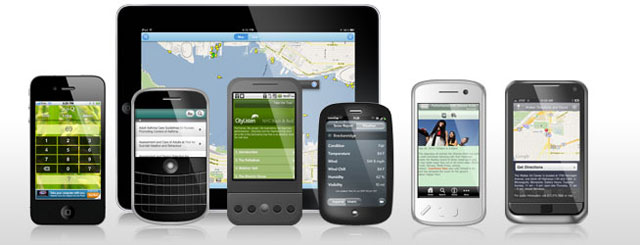It doesn’t take a technology expert to realise that mobile technology is big business. Whether it’s to check emails and keep abreast of our work, or just to keep in contact with friends and family via the many networks and applications, we’re all using mobiles more than ever before, and they’re no longer just a simple tool that can be used to call or text.

In response to this growing popularity, more mobile platforms are being developed that help us to access what we need. There’s big competition amongst the providers, and all of them are looking for new and innovative ways to win your business. Let’s take a look at the top 5 mobile platforms in 2013.
iPhone by Apple
iPhone is possibly the most popular mobile platform, and it’s easy to see why. The app store is extensive, the service is reliable, and the higher price point of the handsets mean that the technology is often viewed as being superior. One of the main selling points of the iPhone is that there are apps available that cannot be accessed on other devices, such as Instagram. If you already use Apple technology in the form of the Mac, you’ll also be pleased to know that your data can be synced to make things easier.
Android by Google
Though Google’s offering was considered to be the underdog for quite some time, it’s now full steam ahead, and it looks set to become the most widely used platform. It’s no surprise either, as Google appears to have a wise strategy for dominating the online marketplace, and mobile is an obvious extension of this. As the technology is open source and free for all, it’s a big hit amongst the techie community. If you work with technology, click here to view information about Cisco firewalls.
Blackberry by RIM
Blackberry is a small company in comparison to some of the other mobile providers, though it has successfully dominated the business mobile marketplace. Due to ease of access to email and calendars, it’s popular amongst those who need to take care of business and is often the first choice amongst companies that need to provide their workforce with mobile phones.
Symbian by Nokia
Though Symbian was previously a market leader, in June this year, Nokia produced its very last phone that would use the technology. It has been reported that it was the platform’s complex and difficult coding structure, that means a phone took 22 months to be developed, that was the nail in the coffin. In today’s quick paced technological environment, this just won’t cut it. Whilst phones will of course exist with this operating platform for quite some time into the future, the fall of Symbian provides a lesson that can’t be ignored by those in the mobile technology business.
Windows Phone 7 by Microsoft
Though perhaps one of the lesser used mobile platforms, Windows Phone 7 has gained much traction in the past year, and this only looks set to increase. Arguably one of the biggest selling points of Windows Phone 7 is the way in which you can access other Microsoft utilities including Word and Excel. Most Microsoft Office files can be opened and edited via the phone.
All of these mobile platforms have their pros and cons. It’s all about working out exactly what you need and making your decision based on which option will really deliver. Do you like playing games on your phone? Maybe iPhone is the best bet for you. Do you need your phone to manage emails and business arrangements on the go? In this case, Blackberry may be the one.
If one thing is clear, it’s that the world of mobile won’t stand still for long. Innovations are being made all of the time, and if a provider wants to stay ahead of their game, they need to meet customer demands.
Do you use mobile technology? Which is your preferred platform, and why?
This article was brought to you by Ruth Richards on behalf of DataCentreShop. Click here to find out more about their products and services, including data centre switches.